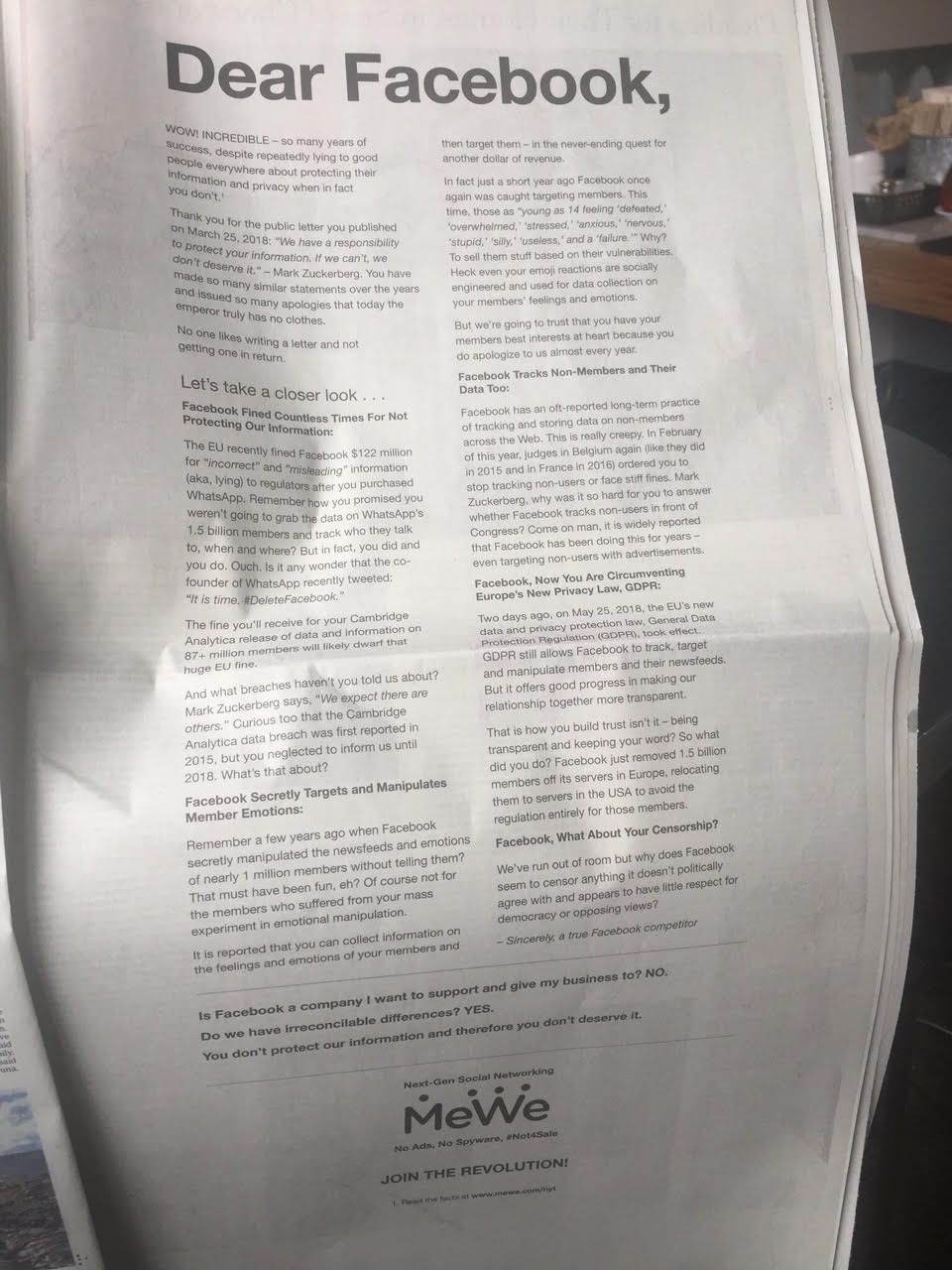Find out the week’s top mobile stories from around the world.
This week.. questions about Google’s move to mobile-first indexing, Facebook competitor calls out platform in full-page ad over privacy, bringing transparency to location data post-GDPR and much more.

Five lingering questions about Google’s move to mobile-first indexing
eConsultancy
Google’s move to mobile-first indexing is under way, but there’s still a lack of clarity in a number of areas. Remember that with mobile-first, Google’s going to be primarily crawling and indexing the mobile version of your website, and using that to determine rankings. This is an idea that Google first mooted in 2016 but has only recently started cautiously rolling out, with plenty of testing to make sure things run smoothly. Here are some of the issues that people are still asking questions about.
1. With so many fully responsive websites today is mobile-first really a big deal?
Many sites today use responsive technology, which means their pages automatically adapt to the device they’re viewed on – whether a desktop or mobile screen. It’s really only those sites that rely on a separate mobile subdomain that are going to be most affected by mobile-first. So why all the fuss?
Read more…
Facebook competitor calls out platform in full-page ad over privacy
Mobile Marketing Magazine
A relatively young social network, hoping to muscle in on Facebook’s dominance, has taken out a full-page ad in the New York Times to call out Mark Zuckerberg’s company over its privacy issues.
MeWe’s ad, which ran on Sunday 27 May, is a response to the public letter published by Zuckerberg back on 25 March which apologised for the way Facebook has handled people’s data and promised to do better because Facebook has “a responsibility to protect your information”.
The New York Times addresses the number of times that Facebook has been fined for its failure to protect personal information, including its $122m fine for misleading regulators over its intentions with user data following the acquisition of WhatsApp in 2014.
Read more…
How one mobile adtech player wants to bring transparency to location data post-GDPR
The Drum
Where other location-based mobile platforms have bowed out of Europe, Location Sciences (formerly Proxama) has unveiled a fully GDPR-compliant tool to help marketers draw better value from their location-based buys.
Location Sciences launched the feature, Verify, earlier this week, but said the timing was purely coincidental.
However, with Verve pulling out of the market entirely, Kargo reducing its headcount and cross-device ID firm Drawbridge parting ways with its media business ahead of the regulation, the confident launch from a mobile player is certainly timely.
Read more…
Japanese mobile gaming firm launches $30m fund for global crypto investments
Tech In Asia
Gumi, a Japanese mobile game publisher and developer, is launching a US$30 million fund to invest in promising blockchain and cryptocurrency companies located anywhere on the globe.
In a statement yesterday, the Tokyo Stock Exchange-listed company said the fund, called Gumi Cryptos, will give its investees “unique access” to Japan’s market.
Gumi Cryptos will be led by Hironao Kunimitsu, the company’s founder and CEO, and Miko Matsumura, founder of US-based virtual currency exchange Evercoin. Matsumura is also an investor in other crypto companies such as FileCoin, Polymath, and Basecoin.
Read more…
Mobile businesses reach even the poorest countries
Nikkei
Mobile-based services, including money transfers and ride-hailing, have spread rapidly around the world and are becoming available in many of the poorest countries.
In some places, more people have mobile payments or apps close at hand than clean drinking water or electricity.
Last year, the number of mobile subscriptions reached 70% of the population in the least developed countries of Africa, Asia and elsewhere. Services once seen as suited only to developed countries are reaching huge and previously untouched markets.
Japan’s Aeon Financial Service is riding this wave. At the end of April it launched a mobile payment service in Cambodia, targeting both large and small retailers in the country. It hopes to attract 300,000 to 500,000 users by 2020.
Read more…
How Brazil Could Become a Regional Leader on Data Protection
Americas Quarterly
The world is awash in data. Each minute, people around the globe take 47,000 Uber trips, write 456,000 tweets, conduct 3.6 million Google searches and receive 103 million spam emails. Every day they create over 2.5 quintillion bytes of information. Personal data given up by mobile phones and computers is the energy – the new oil – that drives the global economy.
All that data floating around raises serious questions about what businesses and government agencies can and cannot do with it. Some countries, particularly in the European Union (EU), have moved quickly to respond to citizen concerns about data privacy, while others, like the U.S., lag behind. Brazil, for the most part, has been a laggard. At least until yesterday.
On May 29, Brazil’s Lower House approved legislation that would require all public and private entities operating in the country to receive consent in order to store a user or client’s personal data.
Read more…
The New Thinking Behind the Mobile App Renaissance
Folio
As Apple’s App Store turns 10-years-old next month, magazine publishers are still figuring out how best to capitalize on the platform they once saw as a potential savior.
By comScore’s math, 57 percent of Americans’ mobile device attention is spent in downloadable apps. For platforms like Facebook, Instagram and YouTube, the legendary user engagement of the most popular apps has been the secret of their ubiquity and success in the mobile era.
But for magazine brands…not so much.
It’s a familiar story. After an initial over-investment in fleets of specialized, well-sculpted, task-oriented mobile apps (remember all those diet and trainer apps?) and digital editions of print titles in the early mobile years, the brutal reality of app dynamics and economics began to set in.
Read more…
Machine learning: Making it work in the real world
ZDNet
Machine learning promises to help businesses automate processes and make smarter decisions based on the huge amounts of data they collect. The result could be sharper insight and better performance. But machine learning and artificial intelligence are still emerging technologies for most companies and few have got further than pilot projects. So how can machine learning best be used to create business benefit? Four industry experts give their best practice tips on making the most of machine learning.
1. USE EXPERIMENTS TO AUGMENT HUMAN KNOWLEDGE
Dentsu Aegis CIO Gideon Kay says his work around machine learning is focused on automation. The aim is to create algorithms that help the advertising specialist’s customers work out what content resonates and to target information to the right audiences around the globe. One area of application is in what Kay refers to as ‘media-mix modelling’.
Read more…
Google’s mobile augmented reality platform arrives in China
Engadget
Google’s ARCore is helpful for making augmented reality widely available to Android users, but there’s a glaring problem: it requires the Play Store to get updates. That’s no good in countries like China, where Google’s services are either unavailable or blocked. Thankfully, Google has a workaround. It’s now making ARCore available in China through the Xiaomi App Store. You’ll need Xiaomi’s Mi Mix 2S to take advantage of the AR features, but this beats having to sit on the sidelines while the rest of the world uses immersive apps.
More ARCore partners are “coming soon,” Google teased.
The search giant isn’t a stranger to this kind of end run. When it wanted to bring Android Wear to China, it initially teamed up with Mobvoi to make the platform available. And in both cases, the motivation is the same.
Read more…
Telegram says Apple has prevented updates on iOS since mid-April, app missed GDPR deadline
Tech Crunch
Encrypted messaging app Telegram is feeling the squeeze out of Russia, where regulators are not letting up in their ongoing attempts to block the app because its publishers refuse to provide regulators with access to messages on the platform.
Pavel Durov has announced that Telegram’s app for iOS is having issues with certain features like stickers after the iOS 11.4 update this week. Updates to the app are being prevented globally, he said, by Apple after the Russian regulator ordered Apple to remove Telegram from the App Store altogether. Durov said this has also meant that Telegram has not been able to issue its GDPR update to comply with the new European regulations that went into effect last week.
For now, Telegram is still in the App Store, albeit with an out-of-date, non-GDPR-compliant version of the app. And confusingly, the move doesn’t apply to all platforms: the Telegram app for Mac is still updating.













